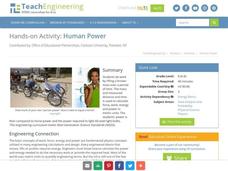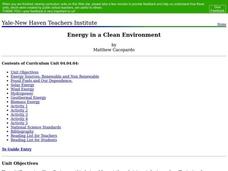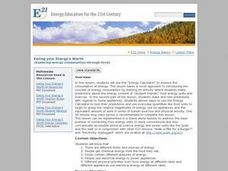Teach Engineering
Human Power
How many humans does it take to power a light bulb? The 10th part of a 25-lesson Energy Systems and Solutions unit has learners conduct an experiment to calculate power. They then use the results to determine how many classmates they...
Curated OER
Potential and Kinetic Energy
In this kinetic and potential energy worksheet, students read about energy of position and energy of motion and are given the equations to find each. Students match 11 terms with their definitions about both types of energy and the...
Curated OER
"Finding" Horsepower
Young scholars investigate horsepower as a unit of power. They examine history and discover that scientists and engineers of high achievement are considered to be among the most valued contributors to their culture.
Curated OER
Types of Circuits and Ohm's Law
In this circuits worksheet, students compare and contrast series and parallel circuits. Students learn about Ohm's Law and define current, voltage, and resistance. This worksheet has 6 matching, 18 fill in the blank, and 8 short answer...
Curated OER
Types of Circuits and Ohm's Law
For this circuits an Ohm's Law worksheet, students read about the differences between series and parallel circuits. They are given Ohm's Law and the definitions of current, voltage and resistance. Students match variables with their...
Curated OER
Energy in a Clean Environment
Young scholars examine the efficiency of each alternative energy source as well as what limitations exist in terms of extracting the usable energy. They determine which energy source is most effective to the economy and the environment...
Curated OER
Bounce!
Students investigate the relationship between potential and kinetic energy. In this energy lesson plan students investigate the height a ball will bounce when dropped from various heights.
Curated OER
Eating your Energy's Worth
Students calculate the amount of electrical energy used in a week in food units. They create ways to reduce energy use. Students discuss the different forms and sources of energy. They discuss how people use electrical energy to power...
Sophia Learning
Sophia: Sciences: Work
This resource gives the definition of work and explains how work is related to force and distance. Also explains the units used to measure work and how it is calculated.
National High Magnetic Field Laboratory
Magnet Academy: James Joule
James Prescott Joule experimented with engines, electricity and heat throughout his life. Joule's findings resulted in his development of the mechanical theory of heat and Joule's law, which quantitatively describes the rate at which...











